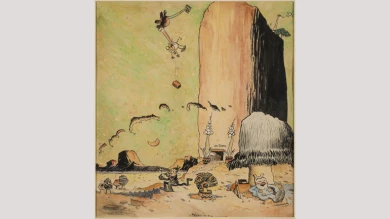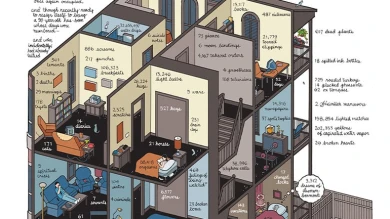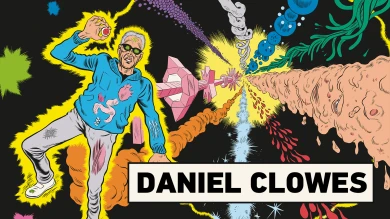-
Tuesday, 10 October 2023 Nouvel Building, Protocol Room
Conversation with Chris Ware
— Participant: Elisa McCausland
Tickets -
Wednesday, 11 October 2023 Nouvel Building, Auditorium 400
Encounter with Chris Ware
— Participants: Carla Berrocal, Enrique Bordes and Raquel Jimeno
Tickets
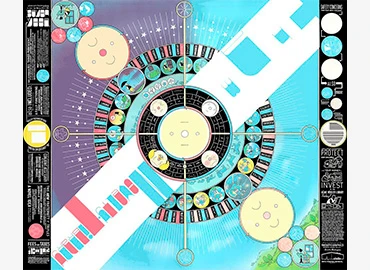
Chris Ware, ACME Novelty Library, 2022 © Chris Ware
Held on 10, 11 Oct 2023
The Documents programme explores the relationships between art and publishing, examining themes that include the effects of archive on narratives of art history, the artist’s book and publishing as an artistic practice. This instalment centres on the work of draughtsman and cartoonist Chris Ware (Omaha, Nebraska, 1967), one of the pre-eminent names in independent comics. Ware will also take part in a conversation with Elisa McCausland and encounter with Carla Berrocal, Enrique Bordes and Raquel Jimeno.
The comic can be regarded as a form of visual writing which, in contrast to prose, gives rise to associations and forms of reminiscence through the conjunction of text and image. Using this quality, Ware explores the borders between the real and the imagined, untethering the full potential of a perfected and virtuoso drawing to shape an architectural world inhabited by profoundly melancholy beings. Such examples are the orphan Jimmy Corrigan, the lonely Rusty Brown or the sad mouse Quimby, a version of Ignatz the mouse, a character by his much-admired George Herriman, one of the pioneers of the medium alongside Winsor McCay, or more recently Charles Schulz, both of whom Ware also cites and pays homage to. Despite their predicaments of failure and marginalisation, these characters continue to dream of other lives, a strain between the realism and escapism characterising the universe and personal history of the comics the artist creates. A further hallmark of his practice are his graphic novels straddling book and artefact, and his design of every aspect, from the typeface to the binding, from the overall storyline to the complex world in each vignette. Moreover, he explores and expands the creative possibilities of the book as an object, as in Building Stories (Pantheon Graphic Novels, 2012), a collection in box format which contains fourteen different types of printed works — newspapers, magazines, folded boards, pamphlets and leaflets — in no particular order and can thus be read depending on the connections each reader wishes to make.
At once a brilliant inventor and methodical artisan of books, Ware has connected with the origins of the comic book, putting forward powerful narrative revisions, and showing us, in a celebration of reading, narration and the page, how the comic strip and drawn stories, even in the digital age, are among the most fascinating artistic practices of our time.
Organised by
Museo Reina Sofía, Centro José Guerrero (Granada City Council) and La Madraza. Centro de Cultura Contemporánea (University of Granada)
Programme
Collaboration
illycaffèParticipants
Chris Ware is a cartoonist. His graphic art, which draws inspiration from American artists from the beginning and middle of the twentieth century, and experiments with the language of the medium are a reference point for scores of cartoonists and illustrators worldwide. His graphic novel Jimmy Corrigan: The Smartest Kid on Earth (2000) won the Guardian First Book Award (UK, 2001) and the Angoulême International Comics Festival Prize for Best Album (Angoulême, France, 2003), while Building Stories received the Eisner Award in 2013. His work has also been displayed in museums such as the Whitney Museum of American Art (New York, 2002), the Museum of Contemporary Art (Chicago, 2006) and Centre Georges Pompidou (Paris, 2022). His practice extends beyond the sphere of the cartoon strip, encompassing illustration and graphic design, as shown by his different covers for The New Yorker or his design of George Herriman’s series Krazy & Ignatz for the publishing house Fantagraphics (2019–2023).
Carla Berrocal is an illustrator and cartoonist. Notable among her publications are Epigrafías (Libros del Autoengaño, 2017), La geometría de los silencios: Relatos reales de vidas imaginarias (CEPE, 2019) and Doña Concha. La rosa y la espina (Reservoir Books, 2021). For the third project mentioned she received a MAEC-AECID Comic Book Grant from the Spanish Academy in Rome. Furthermore, she has curated, with Elisa McCausland, the exhibition Presentes: autoras de tebeo de ayer y hoy (Colectivo de Autoras de Cómic and AECID, 2016), which has toured different institutions.
Enrique Bordes is an architect and researcher specialised in graphic art and comics. His work encompasses different spheres such as the comic strip, architecture, museography and photography. Since 2003, he has combined his professional work with university lecturing and, in 2015, was awarded a grant from the Royal Academy of Spain in Rome, in the Design section. He is the author of the publication Cómic, arquitectura narrativa (Cátedra, 2017).
Raquel Jimeno is an activity coordinator at the Museo Reina Sofía.
Elisa McCausland (1983) is a journalist, critic and researcher specialised in comics. She is a regular contributor to Radio 3, Dirigido por, El Salto and Sofilm, and her most notable publications include Wonder Woman. El feminismo como superpoder (Errata Naturae, 2017) and, with Diego Salgado, Supernovas. Una historia de la ciencia ficción audiovisual (Errata Naturae, 2019) and Sueños y Fábulas. Historia de Vertigo (Ecc Ediciones, 2022). Furthermore, she has curated the exhibition Presentes: Autoras de tebeo de ayer y hoy (Rome, 2016), and promoted Colectivo de Autoras de Cómic (The Collective of Women Comics Artists) and is a member of the ECC-UAH Chair of Comic Research and Culture.

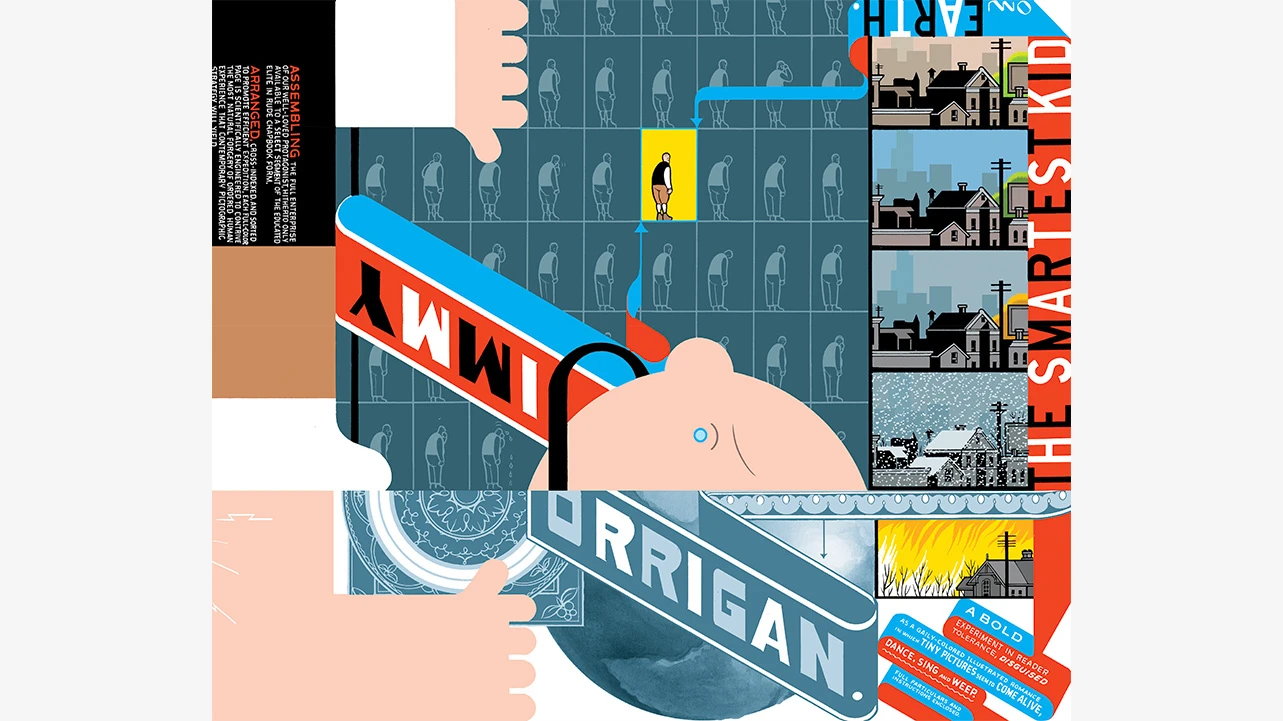

Más actividades

Difficulty. Forms and Political Effects of Deviation in Writing and Contemporary Art
23 February – 14 December 2026 – Check programme
Difficulty. Forms and Political Effects of Deviation in Writing and Contemporary Art is a study group aligned towards thinking about how certain contemporary artistic and cultural practices resist the referentiality that dominates the logics of production and the consumption of present-day art. At the centre of this proposal are the concepts of difficulty and deviation, under which it brings together any procedure capable of preventing artistic forms from being absorbed by a meaning that appears previous to and independent from its expression. By ensuring the perceptibility of their languages, difficulty invites us to think of meaning as the effect of a signifying tension; that is, as a productive and creative activity which, from the materiality of art objects, frees aesthetic experience from the representational mandate and those who participate in it from the passiveness associated with tasks of mimesis and decoding.
The economy of the referential norm translates the social logic of capitalism, where insidious forms of capturing subjectivity and meaning operate. In the early 1980s, and adopting a Marxist framework, poet Ron Silliman highlighted how this logic entailed separating language from any mark, gesture, script, form or syntax that might link it to the conditions of its production, rendering it fetichised (as if without a subject) and alienating its users in a use for which they are not responsible. This double dispossession encodes the political strategy of referential objectivity: with no subject and no trace of its own consistency, language is merely an object, that reality in which it disappears.
The political uses of referentiality, more sophisticated today than ever before, sustain the neoliberal-extractivist phase of capitalism that crosses through present-day societies politically, economically and aesthetically. Against them, fugitive artistic practices emerge which, drawing from Black and Queer studies and other subaltern critical positions, reject the objective limits of what exists, invent forms to name what lies outside what has already been named, and return to subjects the capacity to participate in processes of emission and interpretation.
Read from the standpoint of artistic work, the objective capture of referentiality may be called transparency. Viewed from a social contract that reproduces inequality in fixed identity positions, transparent in this objectivity are, precisely, the discourses that maintain the status quo of domination. Opposite the inferno of these discourses, this group aims to collectively explore, through deviant or fugitive works, the paradise of language that Monique Wittig encountered in the estranged practices of literature. For the political potency of difficulty — that is, its contribution to the utopia of a free language among equals — depends on making visible, first, its own deviations; from there, the norm that those deviations transgress; and finally, the narrowness of a norm which in no way exhausts the possibilities ofsaying, signifying, referring and producing a world.
From this denouncement of referential alienation, fetishisation and capture, Difficulty. Forms and Political Effects of Deviation in Writing and Contemporary Art turns its attention to the strategies of resistance deployed by contemporary artists and poets. Its interest is directed towards proposals as evidently difficult or evasive as those of Gertrude Stein, Lyn Hejinian, Theresa Hak Kyung Cha, Kameelah Janan Rasheed, Kathy Acker, María Salgado and Ricardo Carreira, and as seemingly simple as those of Fernanda Laguna, Felix Gonzalez Torres and Cecilia Vicuña, among other examples that can be added according to the desires and dynamics of the group.
The ten study group sessions, held between February and December, combine theoretical seminars, work with artworks from the Museo Reina Sofía’s Collections and exhibitions, reading workshops and public programs. All these formats serve as spaces of encounter to think commonly about certain problems of poetics — that is, certain political questions — of contemporary writing and art.
Difficulty. Forms and Political Effects of Deviation in Writing and Contemporary Art inaugurates the research line Goodbye, Representation, through which the Museo Reina Sofía’s Studies Directorship seeks to explore the emergence of contemporary artistic and cultural practices which move away from representation as a dominant aesthetic-political strategy and redirect their attention toward artistic languages that question the tendency to point, name and fix, advocating instead for fugitive aesthetics. Over its three-year duration, this research line materializes in study groups, seminars, screenings and other forms of public programming.

Institutional Decentralisation
Thursday, 21 May 2026 – 5:30pm
This series is organised by equipoMotor, a group of teenagers, young people and older people who have participated in the Museo Reina Sofía’s previous community education projects, and is structured around four themed blocks that pivot on the monstrous.
This fourth and final session centres on films that take the museum away from its axis and make it gaze from the edges. Pieces that work with that which is normally left out: peripheral territories, unpolished aesthetics, clumsy gestures full of intent. Instead of possessing an institutional lustre, here they are rough, precarious and strange in appearance, legitimate forms of making and showing culture. The idea is to think about what happens when central authority is displaced, when the ugly and the uncomfortable are not hidden, when they are recognised as part of the commons. Film that does not seek to be to one’s liking, but to open space and allow other ways of seeing and inhabiting the museum to enter stage.

Intergenerationality
Thursday, 9 April 2026 – 5:30pm
This series is organised by equipoMotor, a group of teenagers, young people and older people who have participated in the Museo Reina Sofía’s previous community education projects, and is structured around four themed blocks that pivot on the monstrous.
The third session gazes at film as a place from which to dismantle the idea of one sole history and one sole time. From a decolonial and queer perspective, it explores films which break the straight line of past-present-future, which mix memories, slow progress and leave space for rhythms which customarily make no room for official accounts. Here the images open cracks through which bodies, voices and affects appear, disrupting archive and questioning who narrates, and from where and for whom. The proposal is at once simple and ambitious: use film to imagine other modes of remembering, belonging and projecting futures we have not yet been able to live.

Remedios Zafra
Thursday March 19, 2026 - 19:00 h
The José Luis Brea Chair, dedicated to reflecting on the image and the epistemology of visuality in contemporary culture, opens its program with an inaugural lecture by essayist and thinker Remedios Zafra.
“That the contemporary antifeminist upsurge is constructed as an anti-intellectual drive is no coincidence; the two feed into one another. To advance a reactionary discourse that defends inequality, it is necessary to challenge gender studies and gender-equality policies, but also to devalue the very foundations of knowledge in which these have been most intensely developed over recent decades—while also undermining their institutional support: universities, art and research centers, and academic culture.
Feminism has been deeply linked to the affirmation of the most committed humanist thought. Periods of enlightenment and moments of transition toward more just social forms—sustained by education—have been when feminist demands have emerged most strongly. Awareness and achievements in equality increase when education plays a leading social role; thus, devaluing intellectual work also contributes to harming feminism, and vice versa, insofar as the bond between knowledge and feminism is not only conceptual and historical, but also intimate and political.
Today, antifeminism is used globally as the symbolic adhesive of far-right movements, in parallel with the devaluation of forms of knowledge emerging from the university and from science—mistreated by hoaxes and disinformation on social networks and through the spectacularization of life mediated by screens. These are consequences bound up with the primacy of a scopic value that for some time has been denigrating thought and positioning what is most seen as what is most valuable within the normalized mediation of technology. This inertia coexists with techno-libertarian proclamations that reactivate a patriarchy that uses the resentment of many men as a seductive and cohesive force to preserve and inflame privileges in the new world as techno-scenario.
This lecture will address this epochal context, delving into the synchronicity of these upsurges through an additional parallel between forms of patriarchal domination and techno-labor domination. A parallel in which feminism and intellectual work are both being harmed, while also sending signals that in both lie emancipatory responses to today’s reactionary turns and the neutralization of critique. This consonance would also speak to how the perverse patriarchal basis that turns women into sustainers of their own subordination finds its equivalent in the encouraged self-exploitation of cultural workers; in the legitimation of affective capital and symbolic capital as sufficient forms of payment; in the blurring of boundaries between life and work and in domestic isolation; or in the pressure to please and comply as an extended patriarchal form—today linked to the feigned enthusiasm of precarious workers, but also to technological adulation. In response to possible resistance and intellectual action, patriarchy has associated feminists with a future foretold as unhappy for them, equating “thought and consciousness” with unhappiness—where these have in fact been (and continue to be) levers of autonomy and emancipation.”
— Remedios Zafra

27th Contemporary Art Conservation Conference
Wednesday, 4, and Thursday, 5 March 2026
The 27th Contemporary Art Conservation Conference, organised by the Museo Reina Sofía’s Department of Conservation and Restoration, with the sponsorship of the Mapfre Foundation, is held on 4 and 5 March 2026. This international encounter sets out to share and debate experience and research, open new channels of study and reflect on conservation and the professional practice of restorers.
This edition will be held with in-person and online attendance formats, occurring simultaneously, via twenty-minute interventions followed by a five-minute Q&A.
